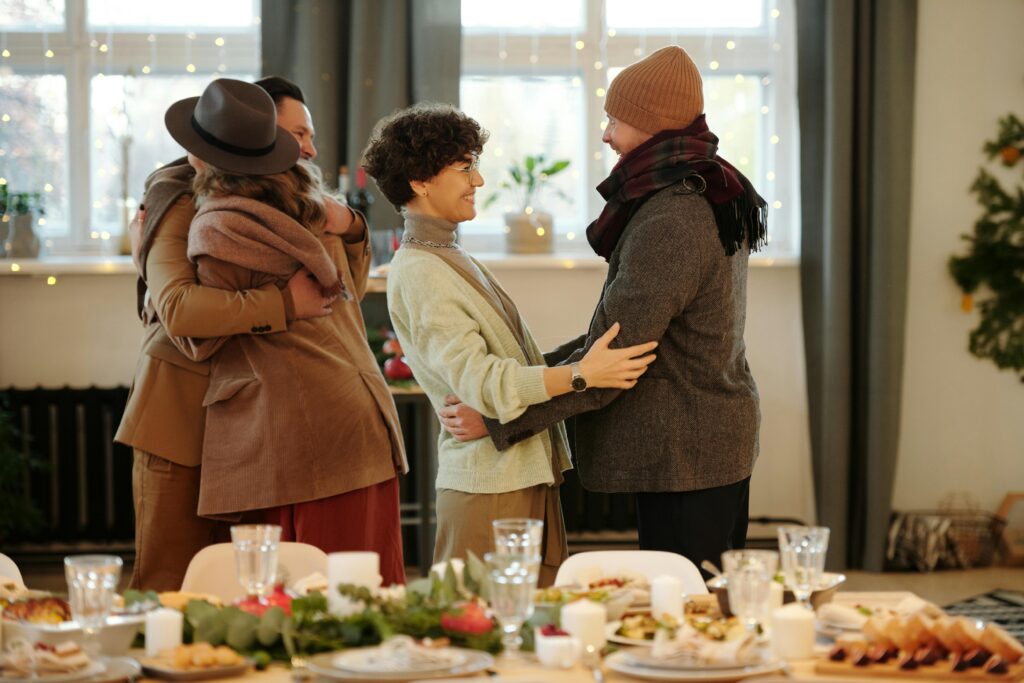
How to Say Hello in German
Hallo (hello) may well have been the very first German word you learned.
Even if you’re just starting out with German, it’ll be useful to have a look at a few more German greetings, or Grüße.
In this post, you’ll learn how to say hello in German in multiple ways, including region-specific greetings and how to answer the phone.
Once you learn these and your German goodbye expressions, you’ll be off to a great start with your German conversation skills.
Contents
- How to Say Hello in German
- Going Beyond “Hallo”
- Other Common German Greetings
- “How Are You?” in German
- Regional Variations of Hello in German
- How to Answer the Phone in German
- How to Practice German Greetings
- And One More Thing...
How to Say Hello in German

The most straightforward way to say “hello” in German is hallo.
As mentioned above, this is one of your typical German greetings. It’s nice and easy to pronounce, and suitable for just about every situation.
Going Beyond “Hallo”

While hallo will work for most situations, there are many other German greetings you can use.
Hi — Hi
Turns out Germans say this too! Go ahead and use Hi when speaking with young people or in informal settings.
Hey — Hey
Yes, you can also just say Hey to greet a friend or good acquaintance. Sometimes it’s written and pronounced as He.
There’s also Heda, which means the same thing, though it isn’t super common. The related Hoi is another similar-sounding variant that’s used more often in southern Germany.
Hallöchen — Hi there / Howdy-do
This is a somewhat flamboyant, friendly way to say hi. It’s a diminutive form of hallo, so it’s a bit like saying “little hello.” Cute!
Huhu — Hiii
This adorable word is a slang term for hi. Use it among close friends, when keeping things really casual.
Other Common German Greetings

When you want to get a little more specific than just a general “hello,” here are some other greetings you can turn to.
Guten Morgen — Good morning
This is how you say “good morning” in German, and is used exactly like the English greeting. It can also be shortened to just Morgen, just like you’d say “Morning” for short in English.
Guten Abend — Good evening
You can say this one in the evening. It’s also used like the English version, which you use as a greeting, but not when saying goodbye.
Guten Tag — Good day
Although the literal translation for Guten Tag, “Good day,” sounds antiquated in English nowadays, it’s still a very common greeting in German, if only slightly more formal.
So when talking to someone you would call “Sir” or “Ma’am,” Guten Tag would be an appropriate greeting. There’s no direct equivalent of “Good afternoon” in German so the closest thing you can say is Guten Tag.
Tag — (Good) Day
Yes, Tag does mean day, but it can also be used as a relaxed, casual greeting that’s even shorter than Guten Tag.
There’s also Tagchen if you’d like to sound more friendly or playful. It literally translates to “little day” (-chen is a diminutive suffix, which makes things sound smaller, cuter or more affectionate).
It may also be pronounced Tachchen in certain regions outside mainland Germany.
Guten Tag zusammen — Hello, everyone
This formal greeting is used when you need to say hello to a group of people. Due to its formality, you might hear it in professional settings like business meetings, presentations or conferences.
In less formal situations, you can just use Hallo zusammen.
Schönen guten Tag — Have a nice day
This is a polite greeting that’s commonly used in more formal settings. Use it in business or professional contexts, or when addressing someone you don’t know well or who holds a higher position.
Gute Nacht — Good night
You can use Gute Nacht just as you would “Good night” in English—right before going to bed.
Lange nicht gesehen — Long time no see
You can say this contracted phrase by itself, or add the person’s name and or a greeting like Hallo beforehand, like this: Hallo Klaus, lange nicht gesehen!
It can be used for pretty much anyone, but if you want to be a little more formal, you can say Wir haben uns lange nicht mehr gesehen (We haven’t seen each other in a long time).
If you’re speaking to someone on the phone, however, you need to get your senses right and use the verb hören (to hear) instead: Lange nichts gehört! (Been a while since we spoke!).
Mahlzeit — Mealtime / Enjoy your meal
A somewhat amusing colloquial greeting, Mahlzeit originates from the complete phrase Gesegnete Mahlzeit, which means “Blessed mealtime.”
Usually, you can greet someone with Mahlzeit around lunchtime, but in some places, you can use it as an all-day greeting. It’s commonly used within the workplace between colleagues as everyone hurries off to grab a bite to eat.
To respond, you can say Mahlzeit right back or politely say danke.
“How Are You?” in German

Wie geht es dir? — How are you?
Use dir when speaking to someone young or someone you know very well. Ihnen is the appropriate formal address for a stranger, especially someone older, and people in positions of authority.
In many English-speaking countries, it’s typical to say “How are you?” to everyone you speak with, including waitresses and store clerks. However, in Germany, this is not as common, so it’s best to use this greeting with people you know.
Wie geht’s? — How’s it going?
Similar to Wie geht es dir, but more casual. This essentially translates to “What’s happening?” or “How’s it going?” ( Geht’s is a shortened form of geht es, so Wie geht’s? literally means “How goes it?”)
Use these greetings the same way you’d use the equivalent English phrases. Perfect for your classmates and friends, potentially not cool with your new boss or super-strict professor.
Was ist los? — What’s up?
Colloquially, this question means the same as Wie geht’s (What’s up?/How’s it going?/How’s it hanging?). Again, fine to use with young people in casual conversation.
However, Was ist los? can also mean “What’s wrong?” especially when you add in a denn. Was ist denn los? usually means “What’s the matter?” and Was ist hier los? can be used to ask “What’s wrong here?” or “What’s going on here?”
But don’t worry: in conversation, you’ll most likely be able to tell the difference between these questions by tone of voice and context.
Alles klar? — Everything alright?
Similar to Was ist los, Alles klar literally translates to “Everything alright?” However, it’s often used as a casual greeting among young people.
When used in that context, Alles klar is basically the same as saying, “What’s up?” or “All good?” in English.
Na? — Well? / How are you?
Na is one of those German words that you’ll hear all the time because it has many different meanings depending on how it’s said. Na! can mean a friendly “Hey!” Said inquiringly as Na?, you’re essentially asking “Well?” or “How are you?”
To be a little more inquisitive, you can say Na, wie geht’s? (Hey, how are you?) or Na, wie läuft’s? (Hey, how’s it going?). And, conveniently enough, you can respond to these inquiries with, you guessed it: Na! (I’m good!)
Regional Variations of Hello in German

Moin (Northern Germany)
Moin is a casual way to say hello in northern Germany, and can also be used as a farewell. It’s speculated that this word may have originated from the Dutch word mooi or Low German word moi, which basically translates to “good.”
You could also double-up and say Moin moin to make your greeting more enthusiastic and cutesy.
Servus (Southern Germany)
This southern greeting can also be used as a goodbye. You might hear Servus used in Bayern and Austria, as well as elsewhere in Central and Eastern Europe.
Servus comes from Latin, and as a greeting or goodbye it was originally a shortened version of the Latin phrase “At your service.”
Grüß Gott (Southern Germany and Austria)
Grüß Gott literally translates to “God greets you.” This can seem like an old-fashioned way of saying hello to someone from northern Germany. However, you’ll definitely still hear it in places like Bayern and Austria, so it’s good to know in case you visit these locations.
Grüß dich (Austria and Switzerland)
This is another version of the original Grüß Gott greeting, except this time the literal translation is “Greet you.” Remember to only use Grüß dich with people you would address casually, and use Grüß Sie for everyone else.
Griaß dich (Bavaria and Austria)
This one’s pretty close to the previous greeting. It’s an informal way to greet someone in Bavaria and Austria, especially among friends and family.
Grüezi (Switzerland)
This is technically a contracted version of Gott grüßt Sie, which is also literally translated to “God greets you.” It’s mostly used in Switzerland.
Habidere (Austria)
Largely regional to Austria, Habidere is a contraction of the phrase Ich habe die Ehre, meaning “I have the honor.” This fancy, rather chivalrous greeting has shortened over time to become Habidere, which is more commonly used in informal contexts.
In fact, some folks may find that Habidere is still too long, so they just say D’Ehre. Seems like laziness is a major factor in the formation of colloquial language.
How to Answer the Phone in German

Many German speakers answer the phone with a simple Hallo? (Hello?) or Ja? (Yes?).
When receiving a call from an unknown caller, it’s common for German speakers to say their full name or just their last name. This is sometimes followed by a greeting. Here are a couple of examples:
Ja, Fischer. (Yes, Fischer residence.)
Simon Fischer, Guten Tag. (Simon Fischer, good day.)
If you’re answering the phone at a business or company, you’d typically say the name of the business or company, your full name and a greeting like Guten Tag! (Good day!).
How to Practice German Greetings
If you aren’t sure about some of these German greetings or when to use them, you can look for resources to watch native speakers using them in context.
YouTube channels like Easy German can give you more insight into greetings and which ones native speakers use. This one-minute video from Babbel is especially useful when you need a refresher:
You can also look for German talk shows which often use these greetings. On top of these, you can learn more everyday German expressions and greetings in context with a program like FluentU.
FluentU takes authentic videos—like music videos, movie trailers, news and inspiring talks—and turns them into personalized language learning lessons.
You can try FluentU for free for 2 weeks. Check out the website or download the iOS app or Android app.
P.S. Click here to take advantage of our current sale! (Expires at the end of this month.)
With these German greetings, you’ll be able to start a conversation in German with ease.
Or at least you can say hello in German and smile and wave with confidence!
Download: This blog post is available as a convenient and portable PDF that you can take anywhere. Click here to get a copy. (Download)
And One More Thing...
Want to know the key to learning German effectively?
It's using the right content and tools, like FluentU has to offer! Browse hundreds of videos, take endless quizzes and master the German language faster than you've ever imagine!
Watching a fun video, but having trouble understanding it? FluentU brings native videos within reach with interactive subtitles.
You can tap on any word to look it up instantly. Every definition has examples that have been written to help you understand how the word is used. If you see an interesting word you don't know, you can add it to a vocabulary list.
And FluentU isn't just for watching videos. It's a complete platform for learning. It's designed to effectively teach you all the vocabulary from any video. Swipe left or right to see more examples of the word you're on.
The best part is that FluentU keeps track of the vocabulary that you're learning, and gives you extra practice with difficult words. It'll even remind you when it’s time to review what you’ve learned.
Start using the FluentU website on your computer or tablet or, better yet, download the FluentU app from the iTunes or Google Play store. Click here to take advantage of our current sale! (Expires at the end of this month.)







